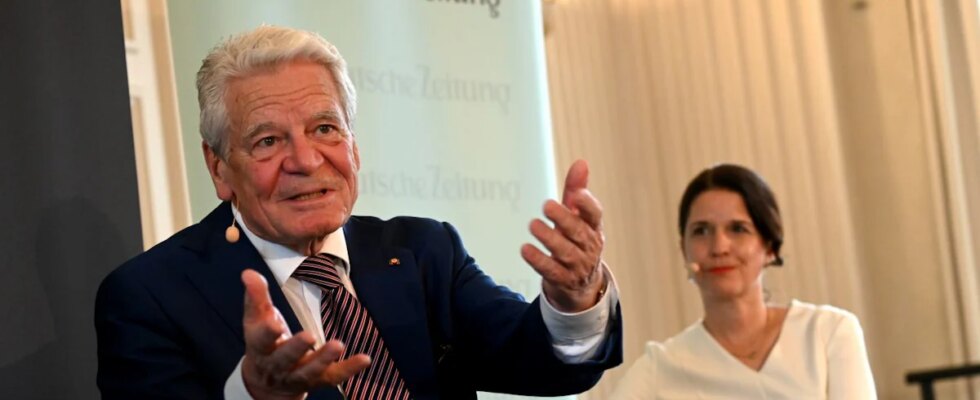The topics have remained presidential. However, the number of people attending his appearances is likely to be due in large part to something that Gauck was once denied in office: clear party political positions. And in this respect he did not disappoint on Monday evening in Munich.
The 320 tickets for the SZ im Dialog series of talks, for which editor-in-chief Judith Wittwer and political editor Stefan Kornelius interviewed him for 90 minutes in the Max-Joseph Hall of the Residenz, were quickly sold out. In the East, it would probably have taken longer, said Gauck, to get the evening off to a cheerful start, as he had “more opponents” there.
“And now, Europe? Why Germany, liberal freedoms and a resilient democracy are important after the election”: That was the title of the evening. After the European elections and before the state elections in Thuringia, Saxony and Brandenburg, the aim was to explore “the resilience of democracy”. Gauck’s conclusion, right at the end: “I believe in this liberal democracy because we have created such a strong civil society that will also be able and willing to defend this form of politics. Not just in Germany, but throughout Europe.”
But the path to final confidence was lined with doubts, warnings and wishes. “Our traffic light coalition,” said Gauck, “has – possibly, perhaps – placed the priorities alongside the main concerns: If the Greens concentrate entirely on climate policy and then neglect industrial and employment policy. If the others make the welfare state ever stronger and think they can make the nation happy with a highly complex citizen’s allowance – then they are pursuing a very special interest.”
Identity politics, group-centered models of progress, the gender-appropriate restructuring of language: “You can get lost in modernisms,” is the 84-year-old’s accusation. His thesis: Such policies ignore the fear of change among a large section of the population. And this fear is particularly high at the moment because there has never been a similar level of border blurring and technological upheaval in history.
“In this phase, the phenomenon of looking for insurance always arises,” said Gauck, adding that the issue of immigration becomes a trigger point. His demand: “We must be able to make decisions on the issue of migration.”
His disagreement with the style of SPD Chancellor Olaf Scholz was unmistakable: “Liberal democracy also needs recognizable leadership,” said Gauck, without being drawn to the topic by a question. “If we wonder what Olaf wants, then no trust will arise. And if there is no trust, then there is the feeling: are they still capable of acting?”

For Gauck, regaining the trust of the electorate is “an important issue”: That is why those in government must “learn to communicate differently – so that we understand better what they want”. Before going public, decisions are needed “that people can be proud of”. The key words “the very talented economics minister” and “heating law” are mentioned. The fact that in 2012, before his first term as Federal President, the SPD and the Greens were the first to put him forward as a candidate seemed very far away at the time.
Gauck sees a great danger of appeasement in current security policy: “In terms of mentality, it is difficult for us to understand that this freedom, this prosperity, this legal security will not survive on their own, but only if they have a population ready to defend themselves.”
His demand: an awareness like that of the Cold War blocs. And: “The willingness of a Helmut Schmidt who, although most of his comrades were totally willing to make peace, said: ‘No, I see a lot of missiles behind Rostock and near Berlin. And I don’t want to be defenseless. We’re rearming.'”
So Scholz should dare to be more Schmidt? Yes, said Gauck, but not only that: “I actually want more Willy Brandt too. Because the great peace politician never supported the Bundeswehr with less than two percent (of the gross domestic product/Editor’s note) fitted.”
As in his books, Gauck let his gaze wander this evening. To the left, to the right, to the back – and, of course, to the east. His prediction for the state elections in Thuringia and Saxony on September 1st? “We will see coalitions that we will have to get used to.”
He called the former SED, PDS and Left Party politician Sahra Wagenknecht, who is likely to become a major player with an alliance under her name, a “great master of calculation”. Despite the clearly audible antipathy, he nevertheless recommended that the Union should seek an alliance with the Wagenknecht supporters if in doubt: “Better with them than with the AfD. Unfortunately. That’s the way it is.”
Democracy will be able to withstand this too. After all, there is no threat of similar conditions in the federal election in autumn 2025 – because four-fifths of those eligible to vote will then live in the West.

